Conclavoscope - Analisi dei Cardinali della Chiesa Cattolica
Posizionamento ideologico e pastorale dei cardinali
Con la morte di Papa Francesco, molti sguardi si rivolgono verso il prossimo conclave. Ecco i "papabili": i cardinali considerati più probabili successori di Francesco. Questa analisi presenta i candidati più probabili, raggruppati secondo le loro tendenze teologiche e pastorali.
Questi cardinali sono fermamente legati alla Tradizione cattolica e si oppongono fortemente alle recenti riforme, in particolare alla restrizione della Messa tridentina, agli accordi segreti con la Cina, alla comunione per i divorziati risposati e alle benedizioni per le coppie dello stesso sesso.
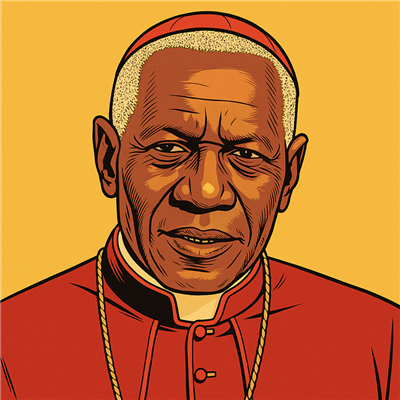
Nato il 15 giugno 1945 a Ourous, in Guinea, Robert Sarah è stato ordinato sacerdote nel 1969. A 34 anni, nel 1979, è diventato arcivescovo di Conakry, il più giovane vescovo cattolico dell'epoca. Ha ricoperto questa posizione fino al 2001, periodo durante il quale ha resistito al regime marxista di Sékou Touré, difendendo la libertà religiosa e l'autonomia della Chiesa. (Cardinal Robert Sarah: A Leading Contender for the Pope Office, Pope Francis accepts Cardinal Robert Sarah's resignation from ...)
Nel 2001, è stato nominato segretario della Congregazione per l'Evangelizzazione dei Popoli, poi presidente del Pontificio Consiglio Cor Unum nel 2010. Nello stesso anno, è stato creato cardinale da Benedetto XVI. Nel 2014, Papa Francesco lo ha nominato prefetto della Congregazione per il Culto Divino e la Disciplina dei Sacramenti, incarico che ha ricoperto fino al suo ritiro nel 2021. (Pope Francis accepts Cardinal Robert Sarah's resignation from ..., 14 cardinals will no longer be electors at the end of 2025 - Aleteia, Le cardinal Sarah ne sera bientôt plus électeur du Conclave - Aleteia)
Autore di diverse opere influenti come Dio o niente (2015), La forza del silenzio (2016) e Si fa sera e il giorno ormai volge al declino (2019), è riconosciuto per la sua difesa dei valori tradizionali della Chiesa.
Il cardinale Sarah è identificato come una figura conservatrice, legata alla liturgia tradizionale e agli insegnamenti morali classici della Chiesa. Critica la secolarizzazione e difende una visione della Chiesa centrata sulla preghiera, il silenzio e la fedeltà dottrinale.
Beneficia del sostegno di cardinali che condividono le sue convinzioni tradizionali, in particolare in Africa e in Europa. Tuttavia, poiché la maggioranza dei cardinali elettori è stata creata da Papa Francesco, la sua influenza potrebbe essere limitata rispetto a candidati più allineati con le recenti riforme.
Questi cardinali sono allineati con la linea ratzingeriana e sono più conservatori da un punto di vista teologico, morale e pastorale, pur accettando il Concilio Vaticano II e le sue riforme.
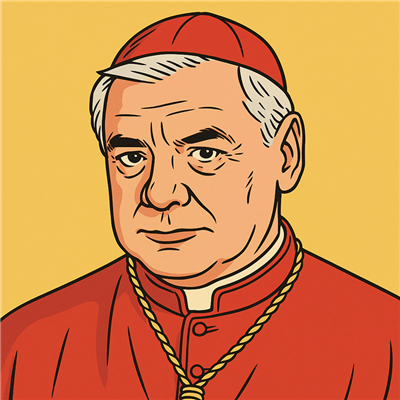
Nato il 31 dicembre 1947 a Finthen, vicino a Magonza (Germania), Gerhard Ludwig Müller è stato ordinato sacerdote nel 1978. Ha conseguito un dottorato in teologia sotto la direzione del cardinale Karl Lehmann, con una tesi su Dietrich Bonhoeffer. Nel 1986, è diventato professore di teologia dogmatica all'università Ludwig-Maximilian di Monaco. (Gerhard Ludwig Müller - Wikipedia, Gerhard Ludwig Müller, Liberation Theology Interview with Archbishop Gerhard Ludwig Müller)
Nominato vescovo di Ratisbona nel 2002 da Giovanni Paolo II, si è distinto per la sua vicinanza a Joseph Ratzinger, futuro Benedetto XVI, che gli ha affidato l'edizione tedesca delle sue opere complete.
Nel 2012, Benedetto XVI lo ha nominato prefetto della Congregazione per la dottrina della fede, carica che ha ricoperto fino al 2017. È stato creato cardinale da papa Francesco nel 2014. (Cardinal Gerhard Müller: le pape au COE, un bon signe pour l'œcuménisme ..., Gerhard Ludwig Müller Biography - Pantheon World)
Dalla fine del suo mandato alla guida della Congregazione per la dottrina della fede, il cardinale Müller è diventato una delle principali figure della corrente conservatrice all'interno della Chiesa cattolica. Critica regolarmente alcuni orientamenti del pontificato di Francesco, in particolare in materia di dottrina e disciplina sacramentale. (Cardinal Gerhard Müller: le pape au COE, un bon signe pour l'œcuménisme ..., Gerhard Ludwig Müller)
Il cardinale Müller è identificato come un rappresentante della corrente conservatrice. Insiste sulla fedeltà alla dottrina tradizionale della Chiesa ed esprime riserve su alcune evoluzioni pastorali recenti, in particolare in materia di morale sessuale e disciplina sacramentale.
Sebbene nominato cardinale da Francesco, è vicino agli ambienti conservatori, in particolare in Europa e in Nord America. Tuttavia, essendo la maggioranza dei cardinali elettori creati da Francesco, la sua influenza diretta all'interno del collegio elettorale è limitata. (Cardinal Müller: Church risks split if it elects a liberal pope)
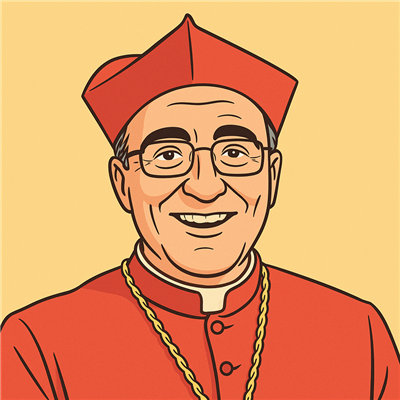
Nato il 4 luglio 1959 a Montevideo (Uruguay), Daniel Fernando Sturla Berhouet è il più giovane di cinque fratelli. Rimasto orfano durante l'adolescenza, è stato profondamente segnato dalla spiritualità salesiana, che ha scoperto presso l'Istituto Giovanni XXIII di Montevideo. È entrato nella Società di San Francesco di Sales (Salesiani di Don Bosco) nel 1979 e ha pronunciato i voti religiosi il 31 gennaio 1980. (Daniel Fernando Sturla Berhouet, Daniel Fernando Sturla Berhouet)
Dopo studi in diritto civile, filosofia, scienze dell'educazione e teologia, è stato ordinato sacerdote il 21 novembre 1987. Ha poi ricoperto vari incarichi di responsabilità all'interno dei Salesiani in Uruguay: maestro dei novizi, direttore dell'Istituto Giovanni XXIII, professore di storia della Chiesa, poi provinciale dell'ordine nel 2008. Nel 2009, è stato eletto presidente della Conferenza dei Religiosi dell'Uruguay. (Daniel Fernando Sturla Berhouet)
Il 10 dicembre 2011, è stato nominato vescovo ausiliare di Montevideo da Papa Benedetto XVI e ha ricevuto la consacrazione episcopale il 4 marzo 2012. L'11 febbraio 2014, Papa Francesco lo ha nominato arcivescovo metropolita di Montevideo. È stato creato cardinale il 14 febbraio 2015, ricevendo il titolo di cardinale presbitero di Santa Galla. (Daniel Fernando Sturla Berhouet, Daniel Sturla)
All'interno della Curia Romana, è membro di diversi dicasteri, tra cui la Congregazione per gli Istituti di Vita Consacrata e le Società di Vita Apostolica, il Pontificio Consiglio per la Promozione della Nuova Evangelizzazione, la Commissione Pontificia per l'America Latina e la Commissione Cardinalizia dell'Amministrazione del Patrimonio della Sede Apostolica. (Daniel Fernando Sturla Berhouet)
Il cardinale Sturla è generalmente considerato conservatore. Ha espresso critiche verso documenti come Fiducia supplicans, definendolo "ambiguo, divisivo e confuso". È anche scettico riguardo al concetto di sinodalità. (Who Will Be The Next Pope? - BIG C CATHOLICS)
In quanto membro di diversi dicasteri romani e figura influente in America Latina, dispone di una rete estesa. Tuttavia, la sua influenza all'interno del collegio dei cardinali rimane moderata rispetto ad altre figure più in vista.
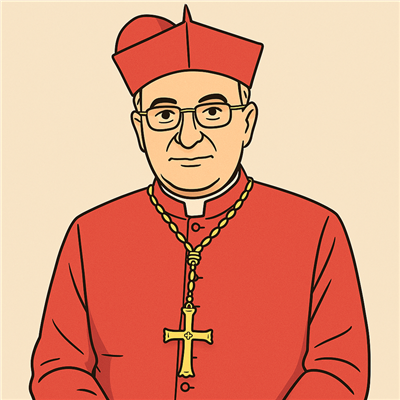
Nato il 15 settembre 1944 a Genova, Mauro Piacenza è stato ordinato sacerdote nel 1969 dal cardinale Giuseppe Siri. Dottore in diritto canonico presso l'Università Pontificia Lateranense, ha esercitato vari ministeri pastorali e accademici nella sua diocesi natale, in particolare come insegnante di teologia dogmatica e storia dell'ateismo. È stato anche giudice presso il tribunale ecclesiastico e assistente diocesano del Movimento ecclesiale di impegno culturale. (Mauro Piacenza, Mauro Piacenza)
Nel 1990, entra nella Curia romana presso la Congregazione per il clero, dove è successivamente capo ufficio (1997), sottosegretario (2000), e poi segretario (2007). Nel 2003, Giovanni Paolo II lo nomina presidente della Pontificia Commissione per i Beni Culturali della Chiesa e vescovo titolare di Victoriana. È consacrato vescovo il 15 novembre 2003 dal cardinale Tarcisio Bertone. Nel 2004, diventa anche presidente della Pontificia Commissione di Archeologia Sacra. (Mauro Piacenza)
Il 7 ottobre 2010, Benedetto XVI lo nomina prefetto della Congregazione per il clero e presidente del Consiglio Internazionale per la Catechesi. È creato cardinale il 20 novembre 2010, con il titolo di San Paolo alle Tre Fontane. Nel 2011, è nominato presidente internazionale della fondazione pontificia Aiuto alla Chiesa che Soffre. (Mauro Piacenza, Mauro Piacenza)
Il 21 settembre 2013, papa Francesco lo nomina penitenziere maggiore della Penitenzieria Apostolica, carica che ricopre fino al 6 aprile 2024. Il 3 maggio 2021, è elevato all'ordine dei cardinali presbiteri. Compie 80 anni il 15 settembre 2024, perdendo così il diritto di voto al conclave. (Mauro Piacenza, Mauro Piacenza)
Il cardinale Piacenza è considerato un conservatore, legato alla tradizione e alla disciplina ecclesiastica. Ha spesso messo in guardia contro il relativismo morale e sottolineato l'importanza del sacramento della confessione. Il suo approccio teologico è incentrato sulla fedeltà al magistero e sulla difesa dei valori tradizionali della Chiesa.
Rete e peso all'interno del collegio cardinalizioSebbene sia stato influente sotto il pontificato di Benedetto XVI, la sua influenza è diminuita sotto papa Francesco. La sua rete è principalmente composta da cardinali e prelati conservatori. Tuttavia, il suo ritiro dal collegio elettorale limita ormai il suo peso nelle decisioni future.
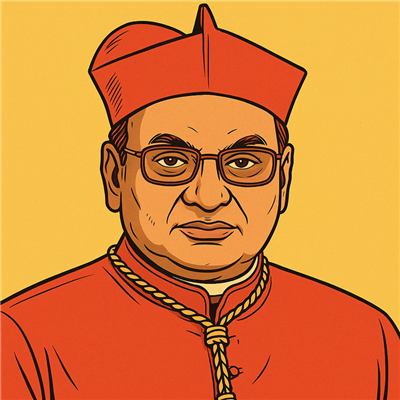
Nato il 15 novembre 1947 a Polgahawela, in Sri Lanka, il cardinale Albert Malcolm Ranjith Patabendige Don è una figura di spicco della Chiesa cattolica asiatica. Ordinato sacerdote nel 1975, ha proseguito i suoi studi a Roma, ottenendo una licenza in teologia biblica presso la Pontificia Università Urbaniana. (24 Albert Malcolm Ranjith Patabendige Stock Photos, High-Res Pictures ...)
Il suo percorso ecclesiastico è caratterizzato da un'alternanza tra responsabilità pastorali e funzioni all'interno della Curia romana. Ha servito in particolare come Segretario aggiunto della Congregazione per l'Evangelizzazione dei Popoli e come Nunzio Apostolico in Indonesia e Timor Est. Nel 2005 è stato nominato Segretario della Congregazione per il Culto Divino e la Disciplina dei Sacramenti, prima di essere nominato Arcivescovo di Colombo nel 2009. È stato creato cardinale da Papa Benedetto XVI nel 2010. (Revue de presse : De quel continent viendra le prochain Pape ?, How Old Will the Next Pope Be? - National Catholic Register)
Come Arcivescovo di Colombo, ha svolto un ruolo centrale nella vita religiosa e sociale dello Sri Lanka, in particolare invocando giustizia e riconciliazione dopo gli attentati di Pasqua del 2019. È anche noto per le sue posizioni critiche nei confronti di alcune politiche governative dello Sri Lanka.
Il cardinale Ranjith è considerato un conservatore, in particolare in materia liturgica e dottrinale. È spesso associato alla linea di pensiero di Papa Benedetto XVI. Tuttavia, non è percepito come un oppositore frontale alle riforme di Papa Francesco, adottando piuttosto una postura di discrezione e fedeltà all'istituzione.
Sebbene disponga di relazioni consolidate all'interno della Curia e tra i cardinali asiatici, la sua influenza sembra limitata rispetto alle reti più estese di alcuni altri papabili. Il suo profilo potrebbe tuttavia attrarre una minoranza di cardinali che desiderano un ritorno a una certa tradizione.
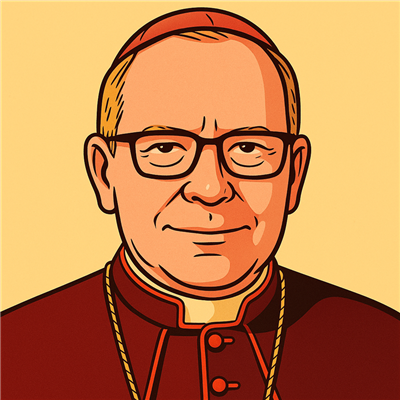
Nato il 22 giugno 1953 a Duivendrecht, nei Paesi Bassi, Willem Jacobus Eijk è uno dei pochi cardinali europei a combinare una rigorosa formazione scientifica con una solida competenza teologica. Prima di entrare in seminario, ha studiato medicina all'Università di Amsterdam e ha esercitato brevemente come medico. Ha poi ottenuto un dottorato in bioetica medica all'Università di Leida, seguito da un dottorato in filosofia all'Università Pontificia San Tommaso d'Aquino a Roma.
Ordinato sacerdote nel 1985 per la diocesi di Roermond, ha insegnato etica medica e teologia morale, mentre faceva parte del consiglio dell'associazione medica olandese pro-vita. Nel 1999 è stato nominato vescovo di Groningen-Leeuwarden, poi nel 2007, arcivescovo metropolita di Utrecht. È stato creato cardinale da Benedetto XVI nel concistoro del 18 febbraio 2012. (Dutch Willem Jacobus Eijk Photos and Premium High Res Pictures - Getty ...)
Il cardinale Eijk è membro di diversi dicasteri romani, tra cui la Congregazione per la dottrina della fede e il Dicastero per la salute. È anche noto per le sue dichiarazioni pubbliche su questioni bioetiche, morale sessuale e fedeltà dottrinale, in particolare nel contesto di una Chiesa olandese fortemente secolarizzata.
Il cardinale Eijk è chiaramente identificato come un rappresentante della corrente conservatrice. Ha espresso critiche sul processo sinodale in Germania e su certe orientazioni del Sinodo sulla sinodalità, mettendo in guardia contro i rischi di confusione dottrinale e frammentazione ecclesiale. Egli sostiene la centralità del magistero romano e una fedeltà rigorosa alla dottrina cattolica.
Sebbene non faccia parte delle figure più in vista del collegio cardinalizio, Eijk gode di una certa stima tra i cardinali legati alla tradizione e alla chiarezza dottrinale. La sua elezione da parte di Benedetto XVI lo colloca nella linea dei cardinali nominati per la loro fedeltà al magistero. Tuttavia, la sua influenza rimane limitata rispetto a figure più centrali nella Curia o nelle grandi diocesi mondiali.
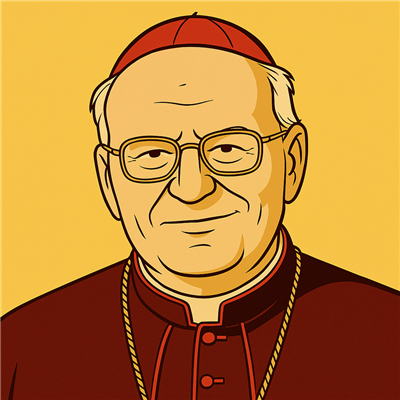
Nato il 25 giugno 1952 a Budapest, Péter Erdő è una figura di spicco della Chiesa cattolica ungherese. Ordinato sacerdote nel 1975, è stato nominato arcivescovo di Esztergom-Budapest nel 2002 e creato cardinale da Giovanni Paolo II nel 2003. È anche presidente della Conferenza episcopale ungherese dal 2005 e ha presieduto il Consiglio delle Conferenze episcopali d'Europa dal 2006 al 2016. (Péter Erdő)
Specialista riconosciuto di diritto canonico, è stato professore all'Università cattolica Péter Pázmány e ha pubblicato numerose opere accademiche. La sua expertise teologica e giuridica gli ha conferito un'influenza notevole all'interno del Vaticano, in particolare come relatore generale del Sinodo sulla famiglia nel 2014. (Le nom des cardinaux 'papabile' qui reviennent le plus souvent, Hungary's Péter Erdő is a strong candidate to be the next pope - and that's reason to be fearful)
Poliglotta, parla correntemente ungherese, italiano, francese, inglese e latino. È anche noto per la sua devozione mariana, in particolare verso Nostra Signora della Consolazione.
Erdő è generalmente classificato tra i conservatori moderati. Difende un'interpretazione rigorosa della dottrina cattolica, in particolare sulle questioni di famiglia e sessualità, evitando però posizioni estreme. Ha espresso riserve sull'ampliamento dei diritti delle persone LGBTQ+ e dei divorziati risposati all'interno della Chiesa. (Hungary's Péter Erdő is a strong candidate to be the next pope - and that's reason to be fearful)
Sebbene la maggioranza dei cardinali elettori siano stati nominati da Papa Francesco, Erdő beneficia di una rete solida, in particolare in Europa centrale e orientale. Il suo profilo accademico e la sua esperienza sinodale gli conferiscono credibilità presso numerosi cardinali, anche in Africa e America Latina.
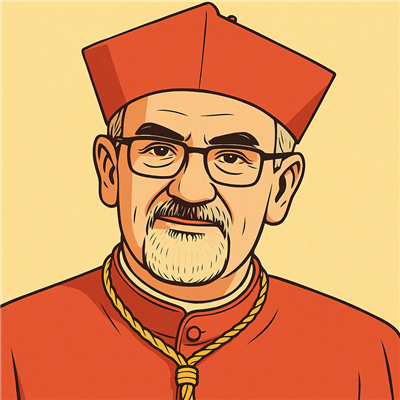
Nato il 21 aprile 1965 a Cologno al Serio, vicino a Bergamo in Italia, Pierbattista Pizzaballa è un francescano che ha dedicato la maggior parte della sua vita sacerdotale alla Terra Santa. Ordinato sacerdote nel 1990 dal cardinale Giacomo Biffi, si è unito alla Custodia francescana di Terra Santa nel 1999, dove ha ricoperto vari incarichi, tra cui quello di superiore del convento dei Santi Simeone e Anna a Gerusalemme. (Pierbattista Pizzaballa)
Nel 2004 è stato eletto Custode di Terra Santa, ruolo che ha mantenuto fino al 2016. Durante questo periodo, si è distinto per i suoi sforzi nel dialogo interreligioso e per il suo impegno per la pace. Nel 2016 è stato nominato amministratore apostolico del Patriarcato latino di Gerusalemme, per poi diventarne patriarca nel 2020. È stato creato cardinale da Papa Francesco nel settembre 2023. (Pierbattista Pizzaballa)
Pizzaballa è percepito come un moderato, che evita gli estremi sia progressisti che conservatori. Questa neutralità potrebbe renderlo accettabile per varie correnti all'interno del collegio cardinalizio. (Le nom des cardinaux 'papabile' qui reviennent le plus souvent)
Sebbene sia stato creato cardinale di recente, la sua reputazione di mediatore e la sua esperienza come patriarca di Gerusalemme gli conferiscono una statura rispettata. Il suo profilo internazionale e il suo impegno per la pace potrebbero attrarre un collegio cardinalizio desideroso di unificare la Chiesa attorno ai valori del dialogo e della riconciliazione. (Cardinal Pizzaballa's Meteoric Rise to 'Papabile')
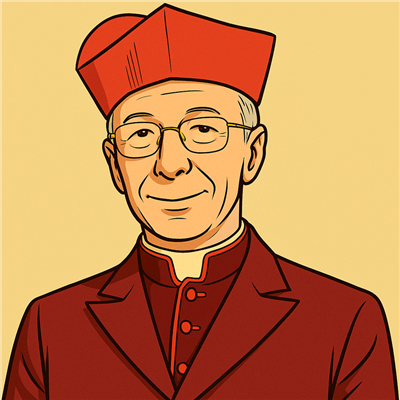
Nato il 14 gennaio 1943 a Pontevico, in Italia, Angelo Bagnasco è stato ordinato sacerdote il 29 giugno 1966 dal cardinale Giuseppe Siri. Ha conseguito un dottorato in filosofia presso l'Università di Genova nel 1979 e ha insegnato metafisica e ateismo contemporaneo presso la Facoltà Teologica dell'Italia Settentrionale fino al 1998. (Cardinal Angelo Bagnasco)
È stato nominato vescovo di Pesaro nel 1998, poi promosso arcivescovo nel 2000. Nel 2003 è diventato ordinario militare per l'Italia, prima di essere nominato arcivescovo di Genova nel 2006. Creato cardinale da Benedetto XVI nel 2007, è stato presidente della Conferenza Episcopale Italiana (CEI) dal 2007 al 2017 e presidente del Consiglio delle Conferenze Episcopali d'Europa (CCEE) dal 2016 al 2021. È andato in pensione come arcivescovo di Genova nel 2020. (Angelo Cardinal Bagnasco - Catholic-Hierarchy, Angelo Bagnasco Biography - Pantheon World)
Bagnasco è considerato un conservatore, fedele alla tradizione dottrinale della Chiesa. Ha espresso posizioni ferme su questioni come l'eutanasia, l'aborto e il matrimonio omosessuale, che ha definito "cavallo di Troia" per la società.
Sebbene sia stato una figura influente all'interno della Chiesa italiana ed europea, la sua influenza attuale è limitata a causa della sua età e del suo pensionamento. Rimane tuttavia rispettato per la sua esperienza e il suo contributo alla Chiesa.
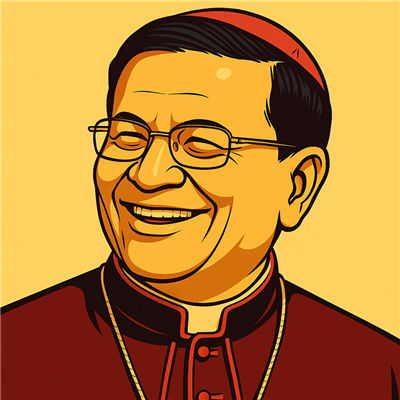
Nato nel 1948 a Monhla, in Birmania (Myanmar), Charles Maung Bo è entrato nella Società Salesiana di Don Bosco ed è stato ordinato sacerdote nel 1976. È stato nominato vescovo di Lashio nel 1990, poi arcivescovo di Yangon nel 2003. Nel 2015, è stato creato cardinale da Papa Francesco, diventando così il primo cardinale birmano.
È stato anche presidente della Federazione delle Conferenze Episcopali dell'Asia (FABC) dal 2018 al 2022, svolgendo un ruolo chiave nel coordinamento degli sforzi pastorali e sociali della Chiesa in Asia. Come membro del Pontificio Consiglio per il Dialogo Interreligioso, ha lavorato per promuovere la pace e la riconciliazione in un paese segnato da conflitti etnici e religiosi.
Il cardinale Bo è spesso percepito come un moderato, che combina fedeltà alla dottrina cattolica e apertura al dialogo interreligioso e sociale. Incarna una Chiesa impegnata sulle questioni di giustizia sociale, pace e diritti umani, senza per questo adottare posizioni teologiche radicali.
Il suo ruolo di presidente della FABC gli ha permesso di stringere legami stretti con numerosi vescovi e cardinali asiatici. Tuttavia, la sua influenza diretta all'interno del collegio dei cardinali resta limitata, in particolare a causa della sua scarsa presenza in Vaticano e della predominanza dei cardinali europei e americani.
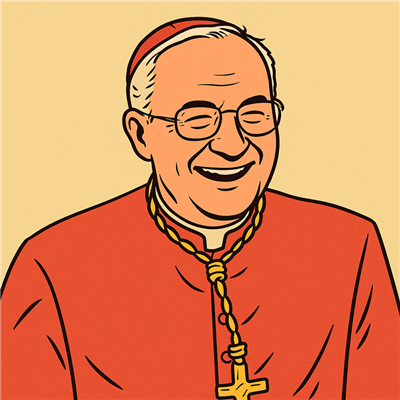
Marc Ouellet è nato l'8 giugno 1944 a La Motte, in Quebec. Ordinato sacerdote nel 1968, è entrato nella Compagnia dei Sacerdoti di San Sulpizio nel 1972. Teologo di formazione, ha insegnato in vari seminari in Canada, Colombia e Roma. Nel 2001, è stato nominato segretario del Pontificio Consiglio per la promozione dell'unità dei cristiani, poi arcivescovo di Quebec nel 2002. È stato creato cardinale nel 2003 da Giovanni Paolo II.
Nel 2010, Benedetto XVI lo ha nominato prefetto della Congregazione per i vescovi (ora Dicastero per i vescovi), posizione che ha occupato fino al 2023. In questa veste, ha giocato un ruolo centrale nella nomina dei vescovi in tutto il mondo. È stato anche presidente della Commissione Pontificia per l'America Latina.
Durante il suo mandato, ha difeso vigorosamente il celibato sacerdotale, in particolare durante il Sinodo per l'Amazzonia nel 2019, quando ha pubblicato il libro Amici dello Sposo per riaffermare l'importanza di questa disciplina nella Chiesa latina.
Il cardinale Ouellet è considerato un conservatore moderato. Difende posizioni tradizionali su questioni come il celibato sacerdotale e si oppone all'ordinazione delle donne. Tuttavia, ha anche sostenuto alcune riforme di Papa Francesco, in particolare riguardo alla selezione dei vescovi, privilegiando profili pastorali e vicini al popolo.
Benché non sia più elettore, la sua influenza rimane notevole grazie ai suoi anni alla guida del Dicastero per i vescovi. Ha contribuito alla nomina di numerosi vescovi e cardinali, il che gli conferisce una rete estesa all'interno della Chiesa. Tuttavia, il suo recente ritiro e le controversie lo hanno allontanato dal centro delle decisioni attuali.
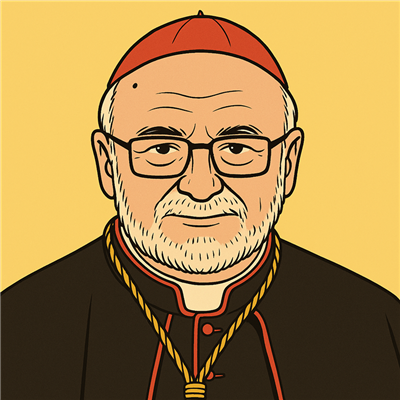
Nato il 24 settembre 1949 a Sorengo, in Svizzera, da genitori svedesi, Anders Arborelius è cresciuto a Lund, nel sud della Svezia. Proveniente da una famiglia luterana non praticante, si è convertito al cattolicesimo all'età di 20 anni, dopo essere stato influenzato dalle suore brigidine e dalla lettura dell'autobiografia di Santa Teresa di Lisieux. Due anni dopo, entra nei Carmelitani Scalzi nel monastero di Norraby. Pronuncia i voti perpetui nel 1977 a Bruges e viene ordinato sacerdote nel 1979 a Malmö.
Titolare di una laurea in lingue moderne dell'Università di Lund e di un dottorato in teologia presso il Teresianum di Roma, viene nominato vescovo di Stoccolma nel 1998 da Giovanni Paolo II, diventando così il primo vescovo cattolico svedese dalla Riforma. Nel 2017, Papa Francesco lo crea cardinale, facendo di lui il primo cardinale nella storia della Svezia e della Scandinavia.
All'interno della Curia Romana, è stato membro del Pontificio Consiglio per la Promozione dell'Unità dei Cristiani, della Congregazione per il Clero, della Congregazione per le Chiese Orientali, del Consiglio per l'Economia e del Dicastero per i Vescovi. Ha inoltre presieduto la Conferenza Episcopale Scandinava dal 2005 al 2015.
Il Cardinale Arborelius è considerato moderato, con una sensibilità spirituale profonda ereditata dalla sua formazione carmelitana. Mette l'accento sulla misericordia, l'unità e il dialogo, pur rimanendo fedele all'insegnamento tradizionale della Chiesa. Ha espresso il suo disagio di fronte alle speculazioni sul conclave e ha sottolineato l'importanza di non politicizzare l'elezione pontificia.
Sebbene non sia tra le figure più influenti del collegio cardinalizio, la sua partecipazione a vari dicasteri e il suo impegno per l'unità cristiana gli conferiscono un certo riconoscimento. Il suo profilo di pastore umile ed esperto potrebbe attrarre i cardinali alla ricerca di un candidato di transizione, capace di mantenere l'equilibrio all'interno della Chiesa.
Questi cardinali occupano una posizione intermedia, molto discreti nelle loro affermazioni, ma che molto probabilmente simpatizzano con il "Partito Francesco" pur mantenendo alcune posizioni più tradizionali.
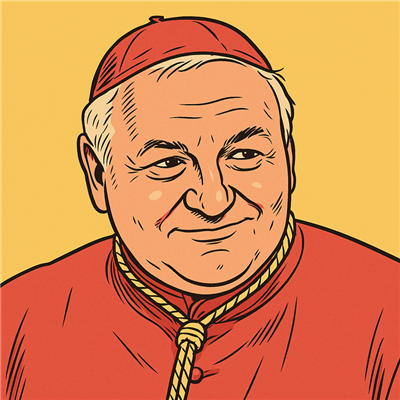
Jean-Marc Aveline è nato il 26 dicembre 1958 a Sidi Bel Abbès, nell'Algeria francese. Dopo l'indipendenza, la sua famiglia si è stabilita a Marsiglia, dove ha completato la sua formazione scolastica. È entrato nel seminario interdiocesano di Avignone nel 1977, poi ha proseguito gli studi al seminario dei Carmelitani a Parigi, ottenendo una doppia laurea in teologia e filosofia, nonché un master in teologia. Nel 2000, ha difeso una tesi di dottorato intitolata Per una teologia cristologica delle religioni.
Ordinato sacerdote il 3 novembre 1984 per l'arcidiocesi di Marsiglia, ha ricoperto vari incarichi legati alla formazione teologica e al dialogo interreligioso. Nel 1992, ha fondato l'Istituto di Scienza e Teologia delle Religioni (ISTR) di Marsiglia, che ha diretto fino al 2002. È stato anche direttore dell'Istituto Cattolico del Mediterraneo e ha insegnato alla facoltà di teologia dell'Università Cattolica di Lione.
Nominato vescovo ausiliare di Marsiglia nel 2013, è diventato arcivescovo metropolita di Marsiglia nel 2019. Il 27 agosto 2022, è stato creato cardinale da Papa Francesco, con il titolo di cardinale presbitero di Santa Maria ai Monti. È membro del Dicastero per i Vescovi e del Dicastero per il Dialogo Interreligioso.
Il 2 aprile 2025, è stato eletto presidente della Conferenza Episcopale Francese, con l'inizio del mandato previsto per il 1° luglio 2025.
Il cardinale Aveline è considerato moderatamente progressista. Sostiene una Chiesa aperta al dialogo, attenta alle sfide contemporanee come la migrazione e la secolarizzazione. Incarna una linea equilibrata tra tradizione e apertura, in sintonia con l'eredità di Papa Francesco.
Beneficia del sostegno di cardinali influenti come Jean-Claude Hollerich e Reinhard Marx. La sua nomina da parte di Papa Francesco e la sua partecipazione attiva ai sinodi rafforzano la sua posizione all'interno del collegio cardinalizio. Inoltre, il suo ruolo di presidente della Conferenza Episcopale Francese gli conferisce una legittimità supplementare.
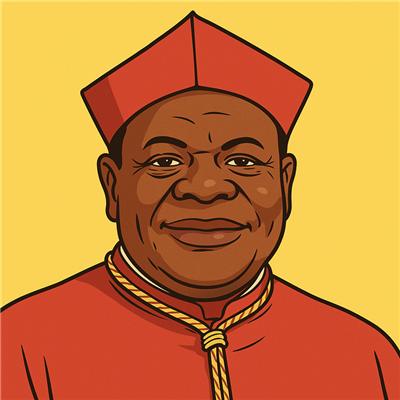
Fridolin Ambongo Besungu è nato il 24 gennaio 1960 a Boto, nella Repubblica Democratica del Congo. Ordinato sacerdote nel 1988 nell'ordine dei Cappuccini, ha ottenuto una licenza in teologia morale all'Accademia Alfonsiana di Roma. È stato nominato vescovo di Bokungu-Ikela nel 2004 da Giovanni Paolo II, poi amministratore apostolico di Kole nel 2008. Nel 2016 è diventato arcivescovo di Mbandaka-Bikoro, prima di essere nominato coadiutore di Kinshasa nel 2018, succedendo a Laurent Monsengwo Pasinya. È stato creato cardinale da Papa Francesco nell'ottobre 2019. (Quién es Fridolin Ambongo Besungu, el papable que puede ser el primer papa africano en 16 siglos, Fridolin Ambongo Besungu)
Ambongo è membro del Consiglio dei cardinali dal 2020, un gruppo ristretto incaricato di consigliare il Papa sulla riforma della Curia romana. Nel febbraio 2023 è stato eletto presidente del Simposio delle Conferenze Episcopali d'Africa e Madagascar (SECAM), rafforzando così la sua influenza sul continente africano. (Le nom des cardinaux 'papabile' qui reviennent le plus souvent, Fridolin Ambongo Besungu)
È riconosciuto per il suo impegno a favore della giustizia sociale, denunciando la corruzione, lo sfruttamento delle risorse naturali e le ingerenze straniere in Africa. Ha anche svolto un ruolo attivo nella mediazione politica nella Repubblica Democratica del Congo, in particolare durante le elezioni del 2018. (Quién es Fridolin Ambongo Besungu, el papable que puede ser el primer papa africano en 16 siglos)
Ambongo incarna una linea conservatrice sulle questioni dottrinali e morali, pur essendo progressista sulle questioni sociali e politiche. Difende una Chiesa radicata nelle realtà culturali africane, opponendosi a ciò che considera una "colonizzazione culturale" occidentale.
Con il suo ruolo all'interno del SECAM e del Consiglio dei cardinali, Ambongo dispone di una rete solida, in particolare tra i cardinali africani e quelli sensibili alle questioni di giustizia sociale. Tuttavia, le sue posizioni conservatrici su alcuni argomenti possono limitare la sua attrattiva presso i cardinali progressisti. (Fridolin Ambongo Besungu)
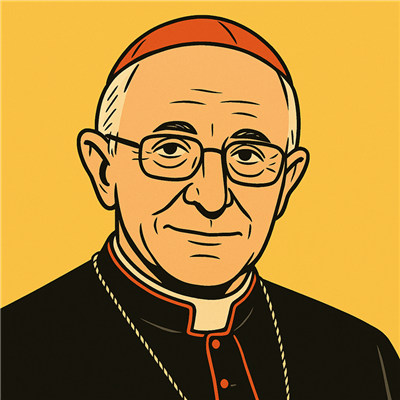
Fernando Filoni è nato il 15 aprile 1946 a Manduria, nella regione delle Puglie in Italia. Ordinato sacerdote nel 1970, è entrato nel servizio diplomatico della Santa Sede nel 1981. La sua carriera diplomatica lo ha portato in posti sensibili, in particolare in Iran durante la guerra Iran-Iraq, in Brasile, nelle Filippine e soprattutto in Iraq, dove è stato nunzio apostolico dal 2001 al 2006. Vi è rimasto in carica anche durante l'invasione americana del 2003, il che gli ha valso un riconoscimento particolare per il suo coraggio e il suo impegno pastorale.
Dal 2007 al 2011, è stato sostituto per gli Affari Generali alla Segreteria di Stato, una posizione strategica al cuore della governance vaticana. Nel 2011, Benedetto XVI lo ha nominato prefetto della Congregazione per l'evangelizzazione dei popoli, funzione che ha occupato fino al 2019. È stato creato cardinale nel 2012.
Dal 2019, è Gran Maestro dell'Ordine equestre del Santo Sepolcro di Gerusalemme, una funzione onorifica ma influente, in particolare in materia di sostegno ai cristiani di Terra Santa.
Filoni è generalmente considerato moderatamente conservatore. È attaccato alla tradizione dottrinale pur essendo aperto ai dialoghi interculturali, in particolare in Asia. Il suo approccio è pragmatico, centrato sulla missione evangelizzatrice della Chiesa.
La sua esperienza e le sue funzioni passate gli assicurano un certo rispetto tra i cardinali, in particolare quelli nominati da Benedetto XVI. Tuttavia, non sembra disporre di un blocco di sostegno sufficientemente strutturato per portare una candidatura forte.
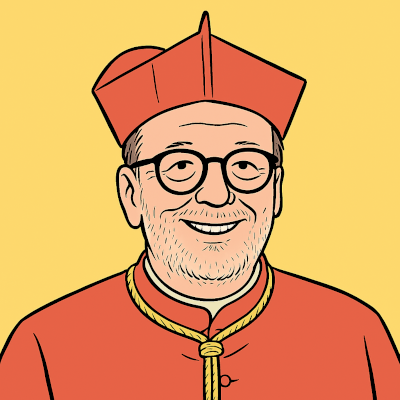
Nato il 7 ottobre 1955 a Verona (Italia), Claudio Gugerotti è stato ordinato sacerdote nel 1982 per la diocesi di Verona. Membro della Società Piena di Don Nicola Mazza, è laureato in lingue orientali e letteratura presso l'Università Ca' Foscari di Venezia, titolare di un dottorato in scienze ecclesiastiche orientali presso l'Istituto Pontificio Orientale, nonché di una licenza in liturgia sacra presso l'Ateneo Pontificio Sant'Anselmo. (Brief biographies of 21 future Cardinals – FABC)
Ha insegnato patristica e liturgia orientale all'Istituto di studi ecumenici di Verona e all'Istituto Pontificio Orientale. Nel 1985 entra nella Congregazione per le Chiese Orientali, diventando sotto-segretario nel 1997. (Cardinal-to-be Claudio Gugerotti, expert in Eastern Europe - Aleteia)
Nel 2001, Giovanni Paolo II lo nomina arcivescovo titolare di Ravello e nunzio apostolico in Georgia, Armenia e Azerbaigian. Successivamente è stato nunzio in Bielorussia (2011–2015), in Ucraina (2015–2020) e nel Regno Unito (2020–2022). Nel novembre 2022 è nominato prefetto del Dicastero per le Chiese Orientali, incarico che ricopre fino al 2025. È stato creato cardinale da Papa Francesco il 30 settembre 2023. (Claudio Gugerotti, Claudio Gugerotti, Le cardinal Claudio Gugerotti envoyé par le pape François en Syrie ...)
È membro di vari dicasteri della Curia romana, tra cui quelli per la dottrina della fede, i vescovi, l'unità dei cristiani, il dialogo interreligioso, la cultura e l'educazione, i testi legislativi, nonché della Commissione pontificia per lo Stato della Città del Vaticano.
Claudio Gugerotti è generalmente considerato moderato, con una particolare sensibilità per le tradizioni orientali della Chiesa. È visto come fedele alla linea di Papa Francesco, in particolare per quanto riguarda il dialogo interreligioso e l'attenzione alle periferie.
Creato cardinale da Papa Francesco nel 2023, Gugerotti gode del sostegno di numerosi cardinali nominati da Francesco, che rappresentano una maggioranza all'interno del collegio elettorale. La sua esperienza diplomatica e le relazioni consolidate all'interno della Curia rafforzano la sua rete di influenza.
Questi cardinali sono favorevoli alle riforme di Francesco e desiderano continuare o approfondire il suo orientamento. Rappresentano l'ala più progressista dei papabili e sono generalmente favorevoli al decentramento, a una maggiore inclusione e all'adattamento della Chiesa alle realtà contemporanee.
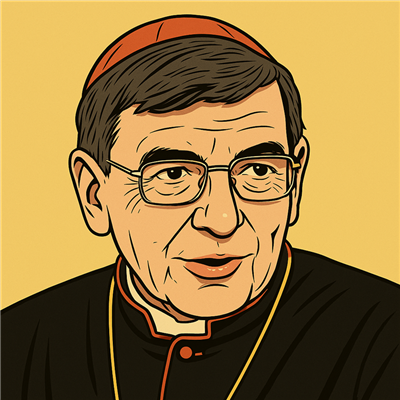
Kurt Koch è nato il 15 marzo 1950 a Emmenbrücke, nel cantone di Lucerna, in Svizzera. Dopo aver studiato teologia all'Università di Lucerna e alla Ludwig-Maximilians-Universität di Monaco, ha ottenuto una licenza in teologia nel 1975. È stato ordinato sacerdote il 20 giugno 1982 per la diocesi di Basilea. (Cardinal Kurt Koch - The College of Cardinals Report, Swiss Cardinal to Speak on Ecumenism | CUA, Kurt Koch)
Dal 1982 al 1989, ha insegnato teologia dogmatica e morale all'Istituto catechetico di Lucerna, poi è diventato professore di teologia dogmatica e liturgica alla facoltà di teologia di Lucerna fino alla sua nomina episcopale. (Kurt Koch)
Il 21 agosto 1995, è stato nominato vescovo di Basilea da Papa Giovanni Paolo II, che lo ha consacrato personalmente il 6 gennaio 1996. Ha ricoperto questa funzione fino al 2010. (Kurt Koch, Kurt Koch)
Il 1° luglio 2010, Papa Benedetto XVI lo ha nominato presidente del Pontificio Consiglio per la promozione dell'unità dei cristiani, carica che ricopre tuttora. È anche presidente della Commissione per i rapporti religiosi con l'ebraismo. Il 20 novembre 2010, è stato creato cardinale diacono di Nostra Signora del Sacro Cuore. Il 3 maggio 2021, è stato elevato al rango di cardinale presbitero. (Kurt Koch)
Il cardinale Koch è considerato moderato, con una sensibilità conservatrice sul piano dottrinale, pur essendo aperto al dialogo interreligioso ed ecumenico. Ha difeso la libertà religiosa, anche per i musulmani in Svizzera, chiedendo al contempo reciprocità nei paesi a maggioranza musulmana. (Kurt Koch)
In quanto membro di diversi dicasteri romani e avendo partecipato al conclave del 2013, dispone di una rete estesa all'interno della Curia e del collegio cardinalizio. La sua lunga esperienza in Vaticano rafforza la sua credibilità istituzionale.
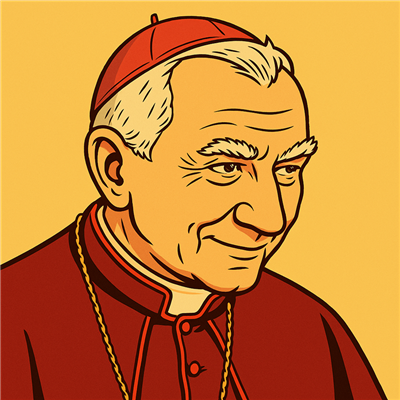
Nato il 17 gennaio 1955 a Schiavon, in provincia di Vicenza (Italia), Pietro Parolin è stato ordinato sacerdote nel 1980. Dopo una breve esperienza pastorale, entra nel 1983 all'Accademia Pontificia Ecclesiastica, iniziando così una carriera diplomatica all'interno della Santa Sede. Serve successivamente nelle nunziature in Nigeria, Messico e Venezuela, prima di raggiungere la Segreteria di Stato nel 2002.
Nel 2009, viene nominato nunzio apostolico in Venezuela, poi, nel 2013, papa Francesco lo designa come Segretario di Stato vaticano, funzione che ricopre fino alla morte del pontefice nell'aprile 2025. In qualità di Segretario di Stato, Parolin ha svolto un ruolo centrale nella diplomazia vaticana, in particolare nell'accordo controverso con la Cina sulla nomina dei vescovi e nel riavvicinamento tra Stati Uniti e Cuba nel 2014.
Nel 2014, Pietro Parolin è stato creato cardinale da papa Francesco. Nel 2018 è stato elevato al rango di cardinale vescovo, ricevendo il titolo suburbicario di Albano. Dopo la morte di papa Francesco nel 2025, presiede le sessioni del conclave convocato il 7 maggio, in quanto cardinale vescovo elettore di rango più elevato.
Parolin è considerato un moderato, o persino un centrista. Sostiene le riforme di papa Francesco adottando al contempo un approccio prudente su argomenti sensibili. Ha espresso posizioni conservatrici sul matrimonio omosessuale, ma si è mostrato aperto a discutere del celibato sacerdotale e del ruolo delle donne nella Chiesa. (Politics aside for one day, world leaders to gather at Vatican and ..., Quién es Pietro Parolin, el candidato italiano que suena con más fuerza para ser el nuevo Papa de Roma)
In qualità di Decano del Collegio dei Cardinali elettori ed ex Segretario di Stato, Parolin gode di grande visibilità e di una rete estesa. È rispettato per la sua capacità di navigare nelle complessità della Curia e di mantenere relazioni diplomatiche stabili. (Conclave de 2025)
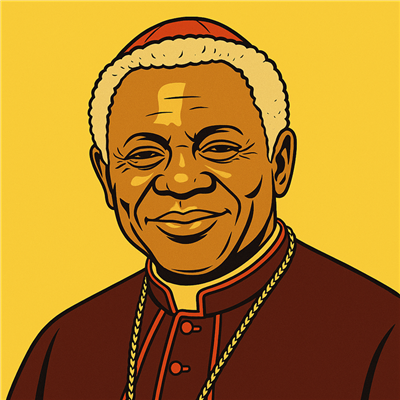
Nato l'11 ottobre 1948 a Wassaw Nsuta, in Ghana, Peter Turkson è il quarto di dieci fratelli. Proveniente da una famiglia modesta, è stato ordinato sacerdote nel 1975 dopo studi in Ghana, negli Stati Uniti e a Roma, dove ha ottenuto un dottorato in Sacra Scrittura presso il Pontificio Istituto Biblico.
Nel 1992, è stato nominato arcivescovo di Cape Coast, diventando così primate del Ghana. Nel 2003, Giovanni Paolo II lo ha creato cardinale, facendo di lui il primo cardinale ghanese della storia. Ha presieduto la Conferenza Episcopale Cattolica del Ghana dal 1997 al 2005.
Nel 2009, Benedetto XVI lo ha nominato presidente del Pontificio Consiglio della Giustizia e della Pace. Nel 2016, è diventato il primo prefetto del Dicastero per il Servizio dello Sviluppo Umano Integrale, incarico che ha ricoperto fino al 2021. Dal 2022, è cancelliere della Pontificia Accademia delle Scienze e della Pontificia Accademia delle Scienze Sociali.
Il cardinale Turkson è generalmente percepito come conservatore sulle questioni dottrinali, pur essendo impegnato sulle questioni sociali e ambientali. Ha collaborato in particolare all'enciclica Laudato si' di Papa Francesco, mettendo in evidenza la giustizia ambientale e sociale.
La sua lunga carriera all'interno della Curia romana e le sue relazioni con i papi Giovanni Paolo II, Benedetto XVI e Francesco gli conferiscono una statura rispettata. Tuttavia, non è considerato un leader di un gruppo specifico di cardinali, il che potrebbe limitare la sua influenza diretta durante il conclave.
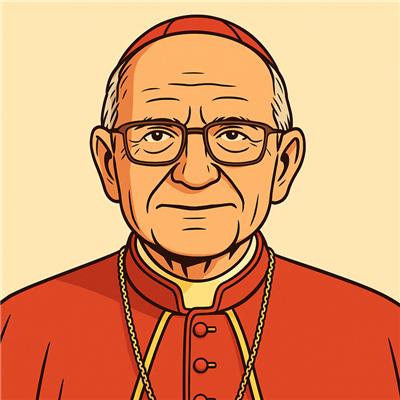
Stephen Brislin, nato il 24 settembre 1956 a Welkom, in Sudafrica, è un influente prelato della Chiesa cattolica sudafricana. Di origini scozzesi e irlandesi, ha studiato psicologia all'Università di Città del Capo, filosofia al seminario di San Giovanni Vianney di Pretoria, teologia all'Istituto missionario di Mill Hill a Londra, e ha ottenuto una laurea all'Università Cattolica di Lovanio. Ordinato sacerdote il 19 novembre 1983 per la diocesi di Kroonstad, è stato nominato vescovo della stessa diocesi nel 2006, poi arcivescovo di Città del Capo nel 2009. Ha ricoperto tale carica fino all'ottobre 2024, quando è stato trasferito all'arcidiocesi di Johannesburg. (Stephen Brislin)
Brislin è stato presidente della Conferenza dei vescovi cattolici dell'Africa australe (SACBC) dal 2013 al 2019 e presidente della Riunione interregionale dei vescovi dell'Africa australe (IMBISA) dal 2012 al 2016. È stato creato cardinale da Papa Francesco durante il concistoro del 30 settembre 2023, ricevendo il titolo di cardinale presbitero di Santa Maria Domenica Mazzarello. È anche membro del Dicastero per le cause dei santi dall'ottobre 2023. (Stephen Brislin)
Brislin è considerato un moderato, allineato con la visione pastorale di Papa Francesco. Ha sostenuto approcci aperti durante i sinodi sulla famiglia, pur rimanendo fedele alla dottrina. Il suo episcopato è caratterizzato da un'attenzione alle questioni sociali e alla giustizia, senza tuttavia adottare posizioni radicali. (Stephen Brislin)
In qualità di presidente della SACBC e dell'IMBISA, Brislin ha instaurato forti legami con i vescovi dell'Africa australe. La sua recente elevazione al cardinalato e la sua nomina a Johannesburg rafforzano la sua statura. Tuttavia, la sua influenza rimane principalmente regionale, e dovrà contare sul sostegno dei cardinali che condividono la sua visione pastorale per sperare di essere eletto. (Stephen Brislin)
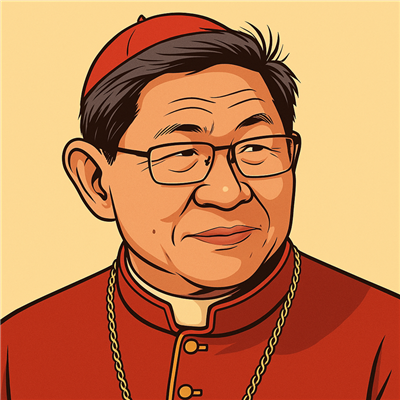
Nato il 21 giugno 1957 a Manila, nelle Filippine, Luis Antonio Gokim Tagle è una figura importante della Chiesa cattolica asiatica. Ordinato sacerdote nel 1982, è stato nominato vescovo di Imus nel 2001, poi arcivescovo di Manila nel 2011. Nel 2012, Papa Benedetto XVI lo ha creato cardinale.
Nel dicembre 2019, Papa Francesco lo ha nominato prefetto della Congregazione per l'evangelizzazione dei popoli. Con l'entrata in vigore della costituzione apostolica Praedicate Evangelium nel 2022, questa congregazione è stata integrata nel nuovo Dicastero per l'evangelizzazione, dove Tagle ha servito come pro-prefetto della sezione per la prima evangelizzazione e le nuove Chiese particolari.
Tagle è stato anche presidente di Caritas Internationalis dal 2015 al 2023. Tuttavia, nel novembre 2022, il Vaticano ha annunciato una riorganizzazione di Caritas, citando "carenze reali" nella gestione, il che ha portato alla fine del suo mandato alla guida dell'organizzazione.
Nel febbraio 2024, è stato elevato al rango di Ufficiale della Legione d'Onore dalla Francia, in riconoscimento del suo impegno per la solidarietà internazionale.
Tagle è generalmente percepito come progressista, allineato con le riforme di Papa Francesco. Sostiene un approccio pastorale inclusivo, che enfatizza la misericordia, il dialogo interreligioso e l'impegno sociale.
Essendo stato nominato cardinale da Benedetto XVI e avendo ricoperto posizioni chiave sotto il pontificato di Francesco, Tagle beneficia di un riconoscimento trasversale all'interno del Collegio cardinalizio. La sua partecipazione attiva ai sinodi e il suo ruolo in Vaticano rafforzano la sua visibilità e influenza.
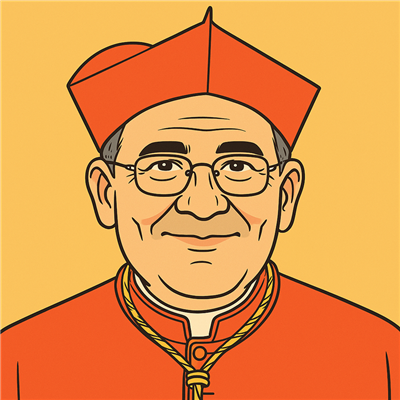
Nato il 15 dicembre 1965 a Machico, sull'isola di Madeira in Portogallo, José Tolentino de Mendonça è stato ordinato sacerdote il 28 luglio 1990. Dottore in teologia biblica, si è distinto per una notevole carriera accademica e letteraria, pubblicando opere di poesia, saggi e teatro. (José Tolentino de Mendonça)
Nel 2011, è diventato consultore del Pontificio Consiglio della cultura. Nel giugno 2018, Papa Francesco lo ha nominato Archivista e Bibliotecario di Santa Romana Chiesa, ed è stato consacrato vescovo titolare di Suava il 28 luglio 2018. Il 5 ottobre 2019, è stato creato cardinale diacono dei Santi Domenico e Sisto. (Profiles of Pope Francis' New Cardinals - National Catholic Register, José Tolentino de Mendonça)
Il 26 settembre 2022, è stato nominato Prefetto del Dicastero per la Cultura e l'Educazione, una posizione strategica all'interno della Curia romana. È anche membro di diversi importanti dicasteri, tra cui quelli per l'Evangelizzazione dei Popoli, le Cause dei Santi, i Vescovi, il Culto Divino e la Disciplina dei Sacramenti, nonché la Dottrina della Fede. (José Tolentino de Mendonça)
Il cardinale Tolentino de Mendonça è considerato uno dei papabili più progressisti, che promuove una Chiesa aperta, dialogante e attenta alle realtà contemporanee. (José Tolentino de Mendonça)
Beneficia del sostegno della comunità di Sant'Egidio, influente negli ambienti ecclesiastici progressisti. La sua vicinanza a Papa Francesco e le sue responsabilità all'interno della Curia rafforzano la sua rete e la sua influenza. (José Tolentino de Mendonça)
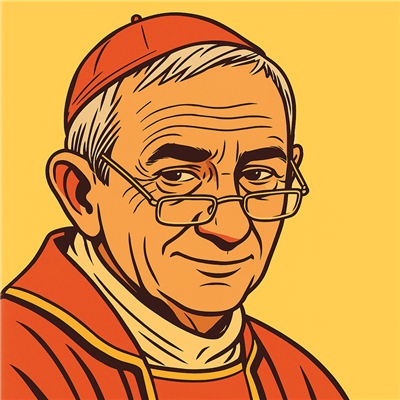
Nato a Roma l'11 ottobre 1955, Matteo Maria Zuppi è il quinto di sei figli di una famiglia profondamente radicata nella Chiesa cattolica. Suo padre era giornalista de L'Osservatore Romano e sua madre era la nipote del cardinale Carlo Confalonieri, ex decano del Collegio cardinalizio. È stato ordinato sacerdote nel 1981 dopo studi in teologia alla Pontificia Università Lateranense e in lettere all'Università La Sapienza di Roma.
Zuppi ha servito per 19 anni come vicario e poi parroco della basilica di Santa Maria in Trastevere, un centro nevralgico della Comunità di Sant'Egidio, un movimento laico impegnato nel dialogo interreligioso e nella mediazione di pace. Ha svolto un ruolo chiave nei negoziati che hanno portato agli accordi di pace di Roma nel 1992, ponendo fine alla guerra civile in Mozambico.
Nel 2012, è stato nominato vescovo ausiliare di Roma da Benedetto XVI, poi arcivescovo di Bologna nel 2015 da Papa Francesco. Quest'ultimo lo ha creato cardinale nel 2019 e lo ha nominato presidente della Conferenza Episcopale Italiana nel 2022.
Nel 2023, Papa Francesco lo ha designato come inviato speciale per la pace in Ucraina, missione che lo ha portato a incontrare funzionari a Kiev, Mosca e Washington per promuovere soluzioni umanitarie e dialogo diplomatico.
Zuppi è considerato un cardinale progressista, allineato con le priorità di Papa Francesco: attenzione ai poveri, dialogo interreligioso, ecologia integrale e apertura pastorale. Sostiene una Chiesa sinodale e inclusiva, pur rispettando la tradizione dottrinale.
Come figura di spicco della Chiesa italiana e vicino a Papa Francesco, Zuppi dispone di una solida rete tra i cardinali nominati da quest'ultimo. La sua influenza si estende anche grazie ai suoi impegni internazionali e al suo ruolo nelle missioni diplomatiche.